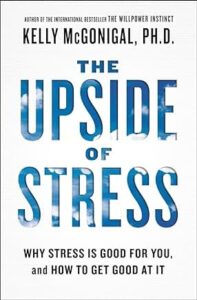What if stress is a good thing?
Stress stems from caring about the events and activities in our lives. If we have various work and family responsibilities, then we feel concerned about managing them as well as possible. That is a good thing. It means we care.
Yet, caregivers can be inundated with messages about the emotional and physical toll of stress, which ironically may leave us feeling more stressed. We can’t stop caring for ourselves and the people in our lives, so what can we do with this information? It turns out that it might be best to ignore those messages and instead focus on the many positive aspects of stress.
Author Kelly McGonigal details the numerous benefits of stress in her book, The Upside of Stress: Why Stress Is Good for You, and How to Get Good at It, which begins by sharing her own discovery of how wrong she was as a psychologist for portraying stress as toxic.

The Stanford University lecturer taught the standard idea that people must reduce their stress to remain healthy when she happened upon a study of thirty thousand people that upended her views. This research found that stress was only unhealthy when people believed it to be unhealthy. In fact, people with highly stressful lives who did not believe that stress was harmful lived longer than people with little stress. The researchers concluded that during the eight years of their study, 182,000 Americans died prematurely simply because they believed that stress was hurting them.
This idea was hard for McGonigal to believe, but as she began studying it further, she found increasing evidence of its truth. For example, she learned that students who received simple interventions about the beneficial aspects of stress succeeded at higher rates than their peers. Other studies showed that when people knew that they could benefit from stress, their bodies produced more beneficial neurochemicals that aided both the processing of stress and their overall health.
So, how can this information help you as a caregiver? If you’re experiencing overwhelming stress, what can you do to turn it to your benefit? Here are some tips from McGonigal’s book.
1) Engage
Engage with your stress. Welcome it in. The stress response is designed to help us. If you are under pressure, your body gets bursts of adrenaline that can aid performance. If you let yourself get excited about how much you can get done due to this spurt of chemical assistance, you might be surprised at how much better you’ll feel and perform. Telling yourself to calm down can actually deter your ability to handle your stress. It’s not that relaxing has no purpose, but it can counter adrenaline’s ability to spur you to new heights. So, if you’re feeling nervous and anxious, try telling yourself, “Great! This means that what I’m doing is important to me, and I’m going to let this stress propel me to succeed.”
2) Connect
Caring, cooperation, and compassion can be enhanced by stress, according to McGonigal. Women in particular often tend to others or reach out to friends when under stress, but men too can be more trusting, generous, and protective when under stress. While anger and aggression can also be reactions to stress, the healthier response is to tend and befriend. When we care for others, our brains produce positive chemicals, such as oxytocin, dopamine, and serotonin, which in turn increase feelings of hope and courage that protect us from the harmful effects of stress. If you’re feeling worn out, remind yourself that simply by caring for your loved one, you are activating these protective chemicals and caring for yourself as well. Also, when you call a friend to ask for support, you are providing an opportunity for that friend to care for you, which provides positive neurochemicals to them. The tend-and-befriend reaction can be a positive chain reaction that is beneficial to everyone.
3) Grow
The most stressful times in our lives tend to be the times when we grow the most. Sometimes that stress is both unwelcome and shocking, such as the stroke that left my husband paralyzed from the neck down. Neither of us wanted that stress. We would have eliminated it from our lives if possible. Yet, we couldn’t wish it away, so we changed. Our appreciation for each other grew. We learned new ways to live. It was hard, and yet stimulated massive personal growth, which reverberates for me many years after his death. If you are experiencing extreme stress, remember that you are also living in a period that offers you incredible potential for growth. By understanding that something good can come from your suffering, you can even enhance your potential for growth, according to McGonigal. So, trust your capacity for resilience and growth, even when the pain is fresh and the future is uncertain. It will benefit you in the long run.
Thank you for reading, please share with a friend, and be well! —KK
We are grateful to be celebrating our 10th year of helping caregivers in need and to be supported by the many generous and caring friends who have helped make a difference in so many lives.
Please consider donating to the Kathi Koll Foundation so you can help make a difference in struggling family caregivers’ lives. Thank you!
Photo 92316401 | Clouds © Zoom-zoom | Dreamstime.com


